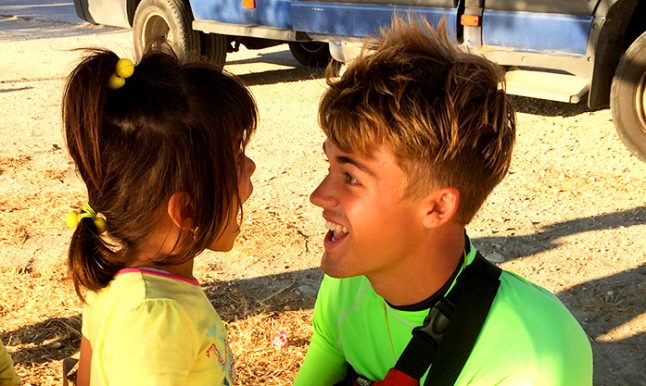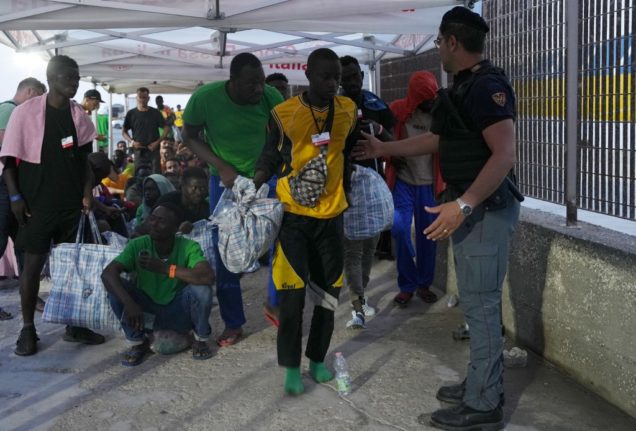Opening or shutting doors. Defending or discrediting refugees. Caring for or turning our backs on vulnerable people fleeing Syria’s cruel war. All is going to be written down, believes Erik Gerhardsson, a 21-year-old Swedish volunteer.
“Syria’s war is intricate and I think history will record how we, individuals or groups, reacted to this tragedy,” he says.
Gerhardsson wants his own entry in this still-being-written saga to be a positive one, even if his efforts only amounted to a very small detail in the perplexing tumult of the ongoing Syrian conflict.
Here’s what he had to tell us, in his own words.
___
I completed high school at the start of the refugee influx. I’d been working and saving money but didn’t have any real commitments. And I had always wanted to volunteer and help.
So in September 2015 when I saw that refugees were suffering from the long journey across Europe, and agonizing in the very same spots where I used to go on holiday, I couldn’t not react. I had to do something.
The first thing I did is donate €500 of my own savings; I started offering what I had on hand. Then a friend of mine who was volunteering with a Swedish humanitarian organization told me that people were in need for blankets in Hungary.
I could mobilize people in our municipality to collect blankets for refugees – and so that’s what we did.
But that wasn’t enough for me, I wanted to be more involved.
Heading to Hungary
It was obvious that many people were not doing anything to help. And then came calls for the borders to be closed. I and three friends of mine took a different stance. We managed to raise €3,000 in donations from family, friends, and people in our hometown that allowed us fly to Hungary to aid refugees en route to Austria in September 2015.
Trains carrying 1,500 people transported refugees closer to Austrian borders every hour. Nonetheless, refugees still had to walk for two to three hours to reach the closest Austrian customs checkpoint. It was a tough journey on foot.
So, we decided to walk part of the way with the refugees and did our best to offer them what they needed along the way. We gave them information to guide them throughout their march to their final destinations.

We offered water, food, and helped carry their kids or bags. Many of them were about to faint from the journey since they had already suffered through harsh conditions before arriving in Hungary.
Helping closer to home
In October we were back in Sweden and found many refugees were arriving to our hometown of Ingarp, part of Eksjö municipality in Småland in southern Sweden.
Here again, my friends and I created a small initiative called Medmänniskor Hjälper to prop up newcomers among us.
Locals in our town donated clothes and other household items that we later distributed to newcomers. We organized more activities such as sports and movie nights. Refugees needed a warm welcome.
Next stop: Greece
The scenes from Lesbos in Greece saddened me indeed. I still can’t get the terrible images out of my head showing hundreds of people sleeping on the ground without a roof.
It was December 2015 when I saw countless refugees shivering in despair in the freezing winter on that island. There weren’t enough places in camps to shelter everyone. I joined a group of volunteers at the notorious camp Moria on Lesbos. A few months later, in March 2016, I joined volunteers with another Greek NGO called Emergency Response Centre International (ERCI).
It was very frustrating as we wanted to share the burden with others, but it felt like we really weren’t able to help much at all.
However, we helped as many families as we could among those suffering most from the freezing temperatures. They were cold, wet, and soaked to their bones. We gave them clothes and hot food, and a small taste of relief.
Heart-breaking moments
In 2016, hundreds of refugees were still arriving to the Greek shores. In March I moved to Lesbos and joined ERCI there also to patrol the coastline and help refugees who might struggle to make it ashore in the rough and unpredictable seas. We basically worked as lifeguards, spotting boats and helping prevent people from drowning.
Throughout the time of my volunteering I came across both hopeful and heart-breaking moments. Some boats arrived with everyone healthy and alive and smiles on their faces; others arrived with people crying and moaning out of fear, or from losing their loved ones.

One time a boat arrived with two corpses aboard. That shocked me. However, there wasn’t time to think much; only to act, and that’s what usually happens in such moments. My colleagues and I pushed the bodies off the boat and continued to help the other lucky ones who survived.
Emotional recovery usually came during rare moments of rest, and talking to each other helped us volunteers ‘heal’ and get over the trauma. Spending the day aiding people and making sure I could stand by every refugee that needed my help was actually the best medicine against emotional deterioration.
A message to Swedes and other Europeans
I’m always ready to go anywhere; wherever there are people on the run in need of help. I think it’s a shame most European countries have shut their borders in the faces of refugees.
Just ask yourselves how you would react if you were in these refugees’ situation! How would you like to be treated? Would you favour being shunned and rejected by other capable societies? I don’t think so.
European states are using resources to deploy soldiers, tighten borders, install walls and fences, and use tear gas, rather than using those resources to help vulnerable fellow humans.
A message to refugees of the Syrian war
You need to know that despite all the misery in your lives, there are lots of great people out there doing their best to help.
We hear you and feel your pain. I know it feels like the whole world has failed to end your suffering, but I hope that you hear me and know that I’m standing by you, and that you are not alone.



 Please whitelist us to continue reading.
Please whitelist us to continue reading.